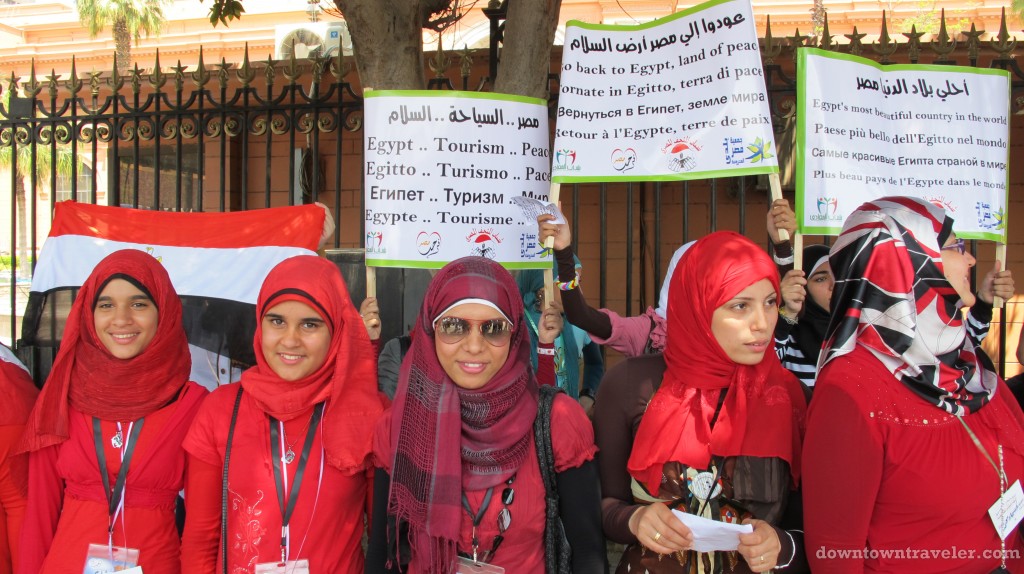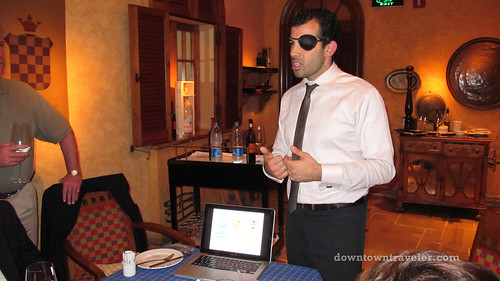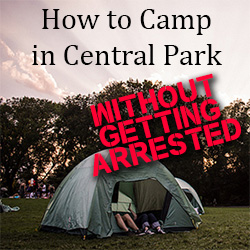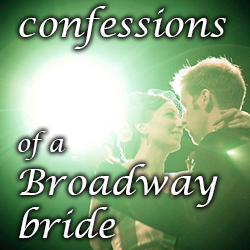This report originally appeared on BusinessInsider.com on May 4, 2011 under the headline, “Actually, It’s A Great Time To Visit Egypt.” It is reprinted on Downtowntraveler.com with permission of the author, Leslie Koch.

Young women in front of the Egyptian Museum in Cairo rallied to promote tourism on April 24, 2011. (photo: Leslie Koch)
“Cleopatra! Cleopatra! Show us your beautiful smile.” Vendors jostled to get my attention as I walked through the narrow alleys of Cairo’s Khan al-Khalili bazaar on a Sunday afternoon.
Creative sales pitches are the norm at this souvenir market, a popular stop on Cairo tours. More surprising was the near total absence of foreign visitors on this late April day.
Rows of silk scarves, camel statues and silver jewelry lay untouched, a symptom of the tourism decline that began with the January 25th revolution.
Tourism dropped 80% at the height of the revolution in February, according to Samy Mahmoud, undersecretary of the Egyptian Tourism Authority.
“For the tourists that are coming, they’re getting a real experience because it is much less crowded,” U.S. Ambassador to Egypt Margaret Scobey said on Easter Sunday. “It’s a different Egypt and in many ways, a more promising one.”
Travel warning lifted
Ambassador Scobey met with the heads of U.S.-based travel associations NTA, USTOA, ATTA and ASTA, along with tour operators and journalists, at the American embassy in Cairo.
The group was on a six-day, fact-finding trip to investigate travel safety in Egypt and Jordan. I traveled with the delegation as they met Egyptian officials and toured Tahrir Square, the Egyptian Museum and other cultural attractions.
“Our recent visit to Cairo confirmed that Egypt is safe and ready for tourists,” said Lisa Simon, president of the NTA, in an email. “The Egyptian people welcomed us with a renewed spirit and pride resulting from the revolution – they’re ready and anxious to show off the ‘new Egypt.’”
The State Department lifted its Egypt travel warning and “ordered departure” status on Thursday, clearing the way for over 800 family members of U.S. embassy personnel to return to Egypt.
American delegates welcomed the news and anticipated a boost in U.S. tourism.
“Lifting the travel warning will go far in restoring US consumer traffic to Egypt. Americans tend to be ‘risk averse’ when it comes to traveling abroad and this significant modification will give them the green light they’re looking for,” USTOA president Terry Dale said in an email.
Americans reluctant to travel
Americans have been slower to return to Egypt than their European counterparts, who tend to visit Red Sea resort destinations like Sharm el-Sheikh. Ever cautious, the U.S. was among the last nations to lift its Egypt travel warning.
British tourists “never stopped” coming to the resort areas and were motivated by great deals, according to Egyptian tour guide Mina Mamdouh Edwar.
Before the revolution about 270,000 Americans visited Egypt each year, compared to nearly 3 million Russian and 1.5 million British visitors, said the Egypt Tourism Authority’s Samy Mahmoud.
“Foreigners have been coming back steadily [and] there have been very few problems,” noted Ambassador Scobey. “It’s not business as usual here, but the military [and] the people of Egypt are doing an incredible job of steering the country towards elections.”
Infrastructure intact
We spotted tourist police in crisp white uniforms near the entrance to the Khan al-Khalili bazaar. Police have gradually returned to their posts, although law and order remains a concern for Egyptians.
Both the ambassador and Egyptian officials stressed that the tourism infrastructure is intact.
“If you go now– Luxor, Aswan, everywhere– there is complete security,” Dr. Zahi Hawass, Egypt’s Minister of Antiquities, told delegates at a dinner on Easter Sunday.
U.S.-based tour operators are working closely with local partners to monitor conditions in Egypt.
“The safety of my travelers is my top priority. I would not send them to a destination, nor would I place them in a situation that I believed was not safe,” said Marie-Rose Lohier, senior program manager at Academic Travel Abroad.
“Concerns about safety in Egypt are not new –they pre-date the January revolution,” noted Lohier, who has organized tours of Egypt for ten years. “I spent two afternoons and one evening out and about in the streets of Cairo and did not, in any way, experience fear or insecurity.”
As I strolled across Tahrir Square, focal point of the revolution, I strained to see any signs of conflict. The grass was newly sodded and a gardener tended to a bed of spring flowers; a burned-out building across from the square– the former headquarters of President Hosni Mubarak– was the only remnant of the uprising.
In summer, Cairo’s temperatures soar into the 90s, marking the low season for American tourists. Egyptian officials anticipate a 90% rebound in tourism in the fall, but the return of U.S. tourists will depend on the outcome of September elections.
“There was no evidence of a military presence in the streets of Cairo and I felt safe the entire time we were there,” said Tony Gonchar, CEO of the ASTA. “The situation is, however, very fluid and we will hope for a smooth next step towards a coalition government and presidential elections.”
Revolutionary tourism
The mood in Egypt was upbeat during my visit, and national pride appears to be at an all-time high.
“They’re all very, very, very proud of what they did. It cuts across class, gender [and] religion… There’s a very strong sense of national pride in Egypt,” noted Ambassador Scobey.
Repeat visitors also picked up on the upbeat mood in Cairo.
“They were just glad that Mubarak is out. I think they have a taste now that they aren’t being oppressed,” said Casey L., a Nevada-based engineer who returned on Thursday from a two-week business trip to Egypt. He found Egyptians to be “more open” than on his first visit in 2006, and “didn’t see any” anti-American sentiment.
The desire to bring back tourism—a cornerstone of the economy—is uniting Egyptians across political parties.
“We take tourism extremely seriously here in this country,” said Amr Badr, Managing Director of tour operator Abercrombie & Kent. “From the highest level of government to the man on the street… it is tourism that we all believe in.”
The tourism decline has had a far-reaching impact and contributed to a 7% decline in the economy during the first quarter of 2011. Political stability will depend on the economic recovery.

Jawad Nabulsi, a leader of the Egyptian revolution, explained plans to bring tourism back to Cairo during a meeting with U.S. tourism delegates. (photo: Leslie Koch)
“If tourism is not back, there is no politics in Egypt,” said Jawad Nabulsi, one of the leaders of the January 25 revolution. For average Egyptians, “the most important thing for them is to eat. If they can’t secure their basic needs, they’ll support whoever pays, whoever is going to feed them,” Nabulsi noted during a dinner with the tourism delegates.
Plans are underway to develop Tahrir Square as a tourist attraction, and Nabulsi is planning a summer music festival that will promote social causes, arts and culture.
Additionally, U.S. tourism operators are incorporating revolutionary attractions in their itineraries.
Marie-Rose Lohier, of Academic Travel Abroad, has updated her Egypt program to include a visit to Tahrir Square and conversations with men and women who participated in the revolution.
The bottom line
Few crowds, intact infrastructure and an upbeat mood make this an ideal time to visit Egypt. In the words of revolutionary Jawad Nabulsi, “This is the best time to come see Egypt in the making.”
***
This is the latest in a series of reports on the “Restoring the Journey” trip that brought US tourism leaders to Egypt and Jordan to investigate travel safety. I accompanied the delegation, which was sponsored by local tourism ministries.
Follow Downtown Traveler on Twitter, Facebook and Flickr for photos and videos of the trip, and look for the hashtag #SafeME on Twitter.

















Hopefully Egypt will see a rebound in tourism. Totally agree that many Americans have been hesitant about the visiting even before the riots. My wife’s aunt and uncle went last year and had a great time!
Thanks for the comment, Jeremy! I think talking to other travelers who’ve visited Egypt is the best way to understand what is really happening on the ground. Before I visited the Middle East last month, I reached out to a blogger living in Cairo and she told me she had no safety concerns, and gave me insight into the country. I’m glad your family had a great trip.
In my experience everything you, and the Egyptian tourism board, say here is true. Unfortunately many people in the “West” get a tainted news supply. They see only the negative side of things.
The saying “bad news sells better” is true here.
If this current Christian / Muslim clash reports quieten down, Egypt good do well to get some domestic tourism going, and bounce international media with some positive homeland reviews
Agreed. The recent Christian/Muslim clash will not help dispel perceptions that Cairo is unsafe. I just received this tweet today from a follower: “I do not think travel is safe in Egypt. Sorry. To much going on in region and they are not even stable :(” Travelers who are getting their information from the news (and not other travelers) seem to think the entire Middle East is a war zone right now. That’s a far cry from what I witnessed on my trip to Egypt and Jordan last month.
I just recently read a report on a riot where 12 people died in Cairo. I hope this does not affect the stability that the military, provisional government, and travel bloggers have worked hard to foster.
I think it will take a while for tourism to rebound. Glad you had such a positive experience.
I read this post in the BusinessInsider.com – you have great coverage as usual.
The lastest clashes between Muslims and Christians are not threatening the Country’s security for tourists. I was there when everything happened and they happened in very delimited areas – plus, outside of Cairo there’s nothing happening anyway. The Red Sea area was not even touched by the Revolution, as well as many other areas of the country.
I know this sounds very cynical but this kind of clashes have happened before in Egypt (not that it’s a good thing, on the contrary it’s very depressing) and they have little to do with the Revolution.
I think this people that think Egypt is not safe are just too lazy to go and find an excuse 🙂 And probably they’ve never been to the Middle East area so they don’t know what they’re talking about.
What about a Christian or Muslim visiting Cairo? You’re saying tourists aren’t being bothered by the clash of these two religions, but what if the tourist belongs to these religions? Particularly a Christian tourist, as Christians are the minority.
I don’t believe as a Christian tourist you’d be treated differently than other tourists. Most Western tourists to Egypt are likely Christian, since they are coming from Russia, Britain, continental Europe and the US. For further reading, Time Magazine recently published an article saying the revolution has created more solidarity between Christians and Muslims: http://ti.me/klHU9S. Additionally, some of the “revolutionary” street art I saw in Cairo had themes of religious tolerance: http://bit.ly/kJio3P. Read the blog http://egyptlife.travelreportage.com to see the perspective of a European foreigner living in Egypt.
Thanks so much!